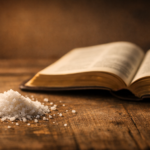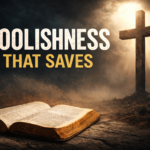“Being Fed (Every Week)” – Luke 22:7-20
Introduction: OT/NT game
Let’s play a little game. If you think the Bible verse I say is from the New Testament stand up. If you think it’s from the Old Testament you can remain seated. (Don’t feel bad if you get it wrong… I didn’t warn anyone to study for a snap quiz!) Here we go…
“I am the Good Shepherd.” – OT or NT? / “Behold, I am doing a new thing.” – OT or NT?
“The virgin shall conceive and bear a son.” – OT or NT?
“God helps those who help themselves.” – OT or NT? (Trick question… Neither!! Lay down?)
“It is more blessed to give than to receive.” – OT or NT?
“The patriarch David died and was buried, and his tomb is here to this day.” – OT or NT?
“Man does not live by bread alone.” – OT or NT? (Trick question… Both!!)
1. Not by bread alone
Man does not live by bread alone – in Deuteronomy 8, God reminded the people of how He provided for them during their 40-year long journey in the wilderness, how their clothes did not wear out, and how He gave them the manna-bread to sustain them every day along the way. But they were not to live on that physical bread alone. They also and especially had the food of the very Word of God to sustain them spiritually.
In the New Testament, Jesus quoted this statement during His 40-day long temptation by the devil. He was fasting during that time and the devil tempted Him to use His divine powers to satisfy His human hunger – turning a stone into bread. But Jesus reminded Himself and the devil that He had the powerful Word of God to sustain Him – both physically and spiritually.
2. God fed His people
There are many occasions in the Bible where God fed His people – individually or corporately – with physical food to sustain their bodies. Let me walk you through some of those times:
A couple of very memorable meals occurred in connection with Israel’s journey from Egypt to the Promised Land. The first one was the Passover meal, their last meal in Egypt before their journey across the Red Sea, through the wilderness, and toward their future home-land. The Passover meal was the sacrificed lamb that provided the blood for their door posts so that the angel of death would pass over their homes. They ate the lamb, and unleavened bread, and bitter herbs – and all the elements of their meal were memory aids to help the people of the future remember what God had done in the past to deliver their ancestors from slavery in Egypt. The Passover was a ‘once-a-year’ meal that they were to eat together as families – just at this time of year. In fact, this year, Passover for the Jewish people begins tomorrow evening at sundown.
I love the little sentence in Exodus 13 that describes the highway the Israelites were to take to their new home. It says, “God did not lead them on the road through the Philistine country, though that was shorter.” Yes, if they had just skirted around the southeast corner of the Mediterranean Sea from Egypt to Israel – a distance of about 300 km. – they would have made the entire journey in about 10 – 15 days. But God had a purpose in leading them south east, across the Red Sea and into the Sinai wilderness. While they were in Egypt, they were slaves, dispersed throughout many towns and villages. God needed to shape them and mold them into a nation. He had to develop their character, their courage, their boldness so that when they got to the Promised Land they would be a cohesive unit, able to defeat the peoples of the land. On the way God fed them – with daily manna, and with quail. It was after that 40-year journey that God reminded them that they didn’t just live on the manna-bread that He provided, but they also lived on God’s Word and promises and covenant made with their ancestors.
Another Old Testament example of God feeding people is when David and his supporters were fleeing from the wrath of King Saul. They came to the town of Nob, and to Ahimelech, the priest. They were hungry, but Ahimelech had no ordinary bread… only the bread that was consecrated and reserved for the priests themselves. But through the priest God allowed David and his men to eat that Bread of the Presence in order to sustain them. Jesus actually referred to that episode when He and His disciples were picking and eating grain on the Sabbath – something that the Pharisees were quick to point out as being unlawful.
3. Jesus fed people (and ate!)
Jesus, Himself, did a lot of eating and feeding in the New Testament, especially in the Gospel of Luke. In Luke 5, Jesus ate a meal with Levi/Matthew and his tax collector friends on the day that He called Matthew to be one of His disciples. In Luke 10, Jesus enjoyed the hospitality and food of Mary and Martha at their home. A few chapters later, Jesus is again criticized behind his back by the Jewish religious leaders for eating with sinners. And a few more chapters later, Jesus basically invites Himself to dinner at Zacchaeus’ house. As a result, Zacchaeus becomes a son of Abraham, a man of faith, and makes amends for his cheating, tax-collecting ways.
Jesus was actually the “host” at two grand meals – one at which He fed 4,000 people with seven loaves of bread and a few small fish, the other at which He fed 5,000 people with five loaves and two fish. It was after the feeding of the 5,000 that Jesus talked about food that endures, spiritual food, in contrast to the physical feeding which leaves one hungry again a few hours later. In that context, Jesus also spoke one of His “I AM” sayings: “I AM the Bread of Life.”
4. Jesus’ intimate meal
Tonight, we want to focus on another meal that Jesus hosted… not a grand meal for thousands, but an intimate meal for Him and His disciples, one in which – like a lived-out parable – He literally gave Himself to us as the Bread of Life. It was that Passover meal, yes, the one that remembered and gave thanks to God for His great act of deliverance in the Old Testament times, the escape from slavery in Egypt under the leadership of Moses. That’s the meal that Jesus and His disciples were enjoying in the Upper Room on the night that He was betrayed and arrested and tried, the night before He was crucified the next day. It was the meal about which He told His disciples: “I have eagerly desired to eat this Passover with you before I suffer.” It was the meal during which, taking the Passover unleavened bread, He said, “This is my body, given for you.” It was the meal during which, taking the Passover cup of wine, He said, “This is my blood of the new covenant.”
After those words – “This is my body… this is my blood” – Jesus urged His disciples (and us) to continue to celebrate that Holy Supper. “This do in remembrance of me.” When St. Paul recorded Jesus’ Words of Institution in 1 Corinthians 11, he added: “As often as you eat this bread and drink the cup, you proclaim the Lord’s death until He comes.”
In the course of physical human life, you are born once, but you eat every day. In our spiritual life, we are baptized once, but we also need to be nourished regularly, often. That spiritual nourishment comes as we hear or read the Word of God, the promises of God, the grace of God. It also comes as we are fed every week or two in this Sacrament of Holy Communion, the Lord’s Supper, the Eucharist, the breaking of the bread. Let’s unpack a little bit of the meaning and the theology of this holy meal.
5. The Large Catechism on Holy Communion
Many of you are familiar with the Small Catechism of Martin Luther, but you may not know that there is also a Large Catechism. It makes sense… if there is a small one, there must be a large one. The Small Catechism was written for the head of the family to teach the chief parts of Christian doctrine to his household. The Large Catechism was written for pastors who were lazy when it came to their personal prayer and meditation on God’s Word. He urged them to be well-versed in those same Christian doctrines so that their preaching and teaching would be effective in leading people to deep and sincere and lasting faith in Christ. Today we are going to hear a little bit of what Luther had to say to the pastors.
a. Food for our souls
Luther called the Sacrament of the Altar a food for our souls, in contrast to a food of and for our bodies. This soul-food nourishes and strengthens the new man / the new woman, those who are made new creations in that other Sacrament… the Sacrament of Holy Baptism. Holy Communion then, is a pasture for us, like David said in Psalm 23: “He makes me lie down in green pastures… He restores my soul.” It sustains and refreshes and strengthens us so that we will be secure in the daily battles against the forces of evil in the heavenly realms.
This Sacrament is given to comfort and bless all who partake of it, but maybe more so for those whose hearts are heavy and burdened with the depth of guilt that comes with an acknowledgment of their sins. It is in Jesus’ body in bread, His blood in wine, that we gain refreshment and power.
b. Refreshment and power for believers
Who is it that receives that refreshment and power? Each person who believes the words and promise of Jesus, Himself – “This is my body… this is my blood, poured out for many (for all) for the forgiveness of sins.” Whoever hears those words, whoever believes those words has what they declare… forgiveness for all their sins. That is comfort. That is refreshment. That is power!
When Jesus gave His disciples this meal, when He gave the Church this meal, when He gave US this meal, He didn’t intend for it to be eaten and remembered only once each year, like the Jewish Passover. When Jewish families celebrated Passover, they would engage in this almost rehearsed dialog between the oldest in the family – the grandpa – and the youngest. That dialog would tell the story of their ancient deliverance from slavery in Egypt in the time of Moses. I assume that’s what Jewish families will be doing again tomorrow evening.
c. Participate “often”
But for us as Christians, Jesus’ words “Do this” mean that we should neither neglect nor ignore participation in this special meal. And Paul’s words “As often as you eat and drink” imply that we should participate often – not being forced to in any way or by any one – but in obedience to Jesus’ invitation, and with a heart longing for the sure and certain forgiveness that Jesus promises. Our participation is not limited to that one evening a year, but is offered as often as each congregation deems fitting. Some of you may remember the “olden days” that my parents tell me about, when there were 4 Communion Sundays in a year. When I was growing up, it was once a month. Now, at Hope, it’s twice a month, with a couple extra opportunities – like Ash Wednesday and Maundy Thursday thrown in. Some other sister congregations celebrate Holy Communion every Sunday. Luther imagined Jesus saying, “I institute a Passover or Supper for you. You shall enjoy it… often, when and where you will, according to everyone’s opportunity and necessity, bound to no place or appointed time.” No matter how often… as often as you eat and drink, you proclaim, you give witness, to Jesus’ death and His forgiveness.
d. Worthy by God’s grace
Luther also writes in his Large Catechism about worthiness. He says that we are not baptized because we are worthy and holy. We do not go to Confession because we are pure and without sin. On the contrary, we go because we are poor, miserable people. We go exactly because we are unworthy. That’s also true for Communion. We would like to be worthy, but that is not a pre-requisite for our coming. We come by Jesus’ invitation and command: “Come to me, all who labour and are heavy laden, and I will give you rest.” We come not because we are holy, but in order to be made holy, blameless, without spot or blemish, flawless – by the grace of God in Jesus.
Luther goes on to describe this Sacrament as a pure, wholesome, comforting remedy for our souls, granting us salvation. It cures us and gives us life in both body and soul. It is a precious antidote against the poison of sin that we all have within us. It contains and brings us God’s grace with all of His gifts, protection and power.
There is a story about a churchgoer who wrote a letter to the editor of a newspaper and complained that it made no sense to go to church every Sunday. “I’ve gone for 30 years now,” he wrote, “and in that time I have heard something like 3,000 sermons. But, I can’t remember a single one of them. So, I think I’m wasting my time and preachers are wasting theirs by giving sermons at all.”
This started a controversy in the “Letters to the Editor” column, to the delight of the editor. It went on for weeks until someone wrote this clincher:
“I’ve been married for 30 years now. In that time my wife has cooked some 32,000 meals. But, for the life of me, I cannot recall the entire menu for a single one of those meals But I do know this. They all nourished me and gave me the strength I needed to do my work. If my wife had not prepared those meals for me, I would be physically dead today. Likewise, if I had not gone to church for nourishment, I would be spiritually dead today!”
That’s true, not just about sermons and the preaching of God’s Word. It’s also true about the Lord’s Supper. We are fed and nourished spiritually each time we receive Christ’s body and blood for the forgiveness of our sins. May you be blessed and fed and nourished each time you come according to Jesus’ own invitation. Amen.






